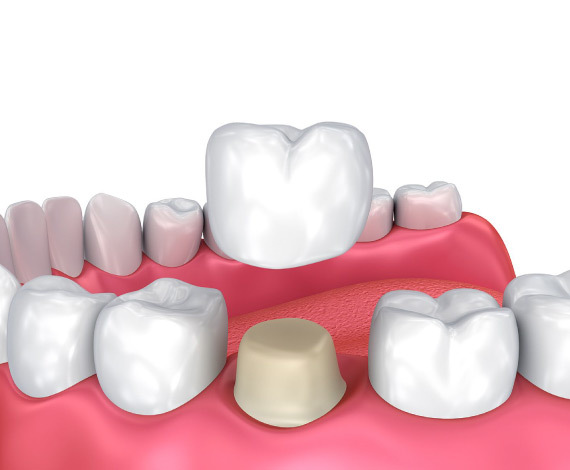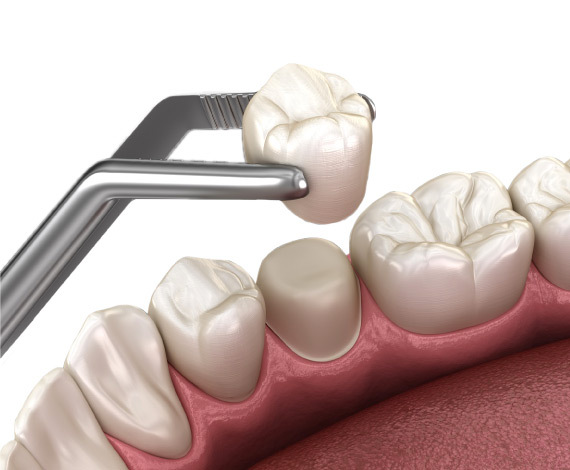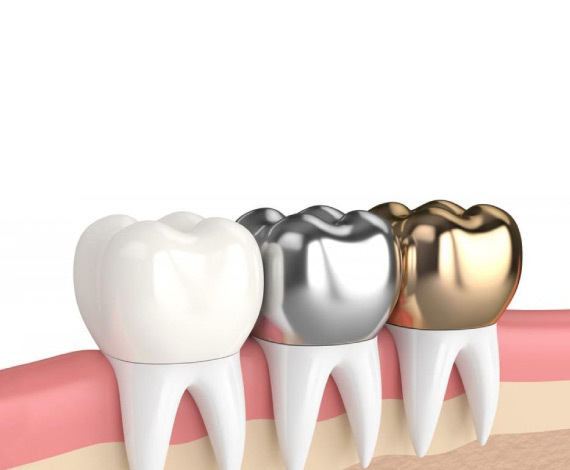
What are Crowns and Bridges?
Crowns and bridges are dental restorations that are cemented onto existing teeth or dental implants to restore function and appearance of damaged or missing teeth. They are fixed prosthetic devices
Dental Crowns
Dental Crowns: A dental crown, also known as a dental cap, is a tooth-shaped covering that encases the entire visible portion of a damaged or weakened tooth above the gum line. It is used to restore the tooth's shape, size, strength, and appearance while protecting it from further damage. Dental crowns are custom-made to match the color and shape of the surrounding teeth. They can be made from various materials, including porcelain, ceramic, metal alloys, and zirconia. Dental crowns are commonly used for teeth with extensive decay, cracks, fractures, large fillings, after root canal treatment, and for cosmetic enhancements.
Dental Bridges
Dental Bridges: A dental bridge is a fixed dental restoration used to replace one or more missing teeth. It consists of one or more artificial teeth (pontics) held in place by dental crowns on the adjacent natural teeth (abutment teeth). The dental crowns are cemented onto the healthy teeth on either side of the gap, and the pontics fill the space left by the missing teeth. Dental bridges are an effective way to restore the function and aesthetics of the smile after tooth loss. Like crowns, the materials used to create dental bridges can vary, and they are custom-designed to fit the patient's mouth.

When are the dental crowns used?
- Dental crowns are commonly used in the following situations:
- Severe Tooth Decay: When a tooth has extensive decay, and a dental filling would not be sufficient to restore its structure, a crown is placed to cover and protect the remaining tooth.
- Fractured or Cracked Teeth: Dental crowns are used to stabilize and protect teeth that have suffered significant fractures or cracks, preventing further damage and potential tooth loss.
- Large Fillings: When a tooth has a large filling, and there is a risk of the tooth breaking or the filling failing, a crown is often placed to provide added strength and support.
- Root Canal Treatment: After undergoing a root canal procedure, the tooth may become more brittle. Placing a crown over the treated tooth helps to protect it from fractures and restores its functionality.
- Misshapen or Discolored Teeth: Dental crowns can be used for cosmetic purposes to improve the appearance of teeth that are misshapen, severely discolored, or have other aesthetic concerns.
- Dental Bridges: Crowns are an essential component of dental bridges, which replace missing teeth. The crowns on either side of the gap anchor the artificial tooth (pontic) in place.
- Dental Implants: Dental crowns are placed on top of dental implants to replace single missing teeth. The implant acts as an artificial tooth root, and the crown serves as the visible, functional part of the replacement tooth.
- Tooth Wear: If a tooth has been significantly worn down due to teeth grinding (bruxism) or other factors, a dental crown can restore its size, shape, and function.
What are the different types of dental crowns?
There are several types of dental crowns available, each with its own advantages and considerations. The choice of crown material depends on factors such as the location of the tooth, esthetic concerns, and budget.
- Porcelain Crowns: Porcelain crowns are popular for their natural appearance and ability to closely match the color of surrounding teeth. They are an excellent choice for front teeth and highly visible areas. Porcelain crowns are aesthetically pleasing but may be more prone to chipping or fracture compared to other materials.
- Porcelain-fused-to-Metal (PFM) Crowns: PFM crowns combine the natural appearance of porcelain with the strength and durability of metal. A metal substructure is used for support, and porcelain is fused on top to provide a natural look. PFM crowns are suitable for both front and back teeth and offer a balance between aesthetics and strength.
- Metal Crowns: Metal crowns are made of various metal alloys, such as gold, silver, or base metal alloys. They are exceptionally durable and resistant to wear. Metal crowns are a suitable option for molars or other teeth that are not highly visible. However, their metallic color makes them less esthetic than porcelain crowns.
- All-Ceramic or All-Porcelain Crowns: These crowns are made entirely of ceramic or porcelain material. They are an excellent choice for individuals with metal allergies or those seeking highly esthetic restorations. All-ceramic crowns are a preferred option for front teeth or when a metal-free restoration is desired.
- Zirconia Crowns: Zirconia crowns are a type of all-ceramic crown known for their strength and durability. They are a suitable option for both front and back teeth and offer excellent aesthetics along with enhanced strength.
- Composite Resin Crowns: Composite resin crowns are made from the same material used for tooth-colored fillings. They are less durable than other crown types and are more prone to wear and staining. Composite crowns are often considered temporary or short- term solutions.

How can you take care of your dental crowns
Taking care of dental crowns is crucial to ensure their longevity and maintain good oral health. Here are some tips to care for your dental crowns:
- Limit Acidic Foods and Drinks: Acidic foods and beverages can erode the tooth enamel and the cement holding the crown in place. Reduce the consumption of acidic items to protect the crown and the underlying tooth structure.
- Practice Good Oral Hygiene: Brush your teeth at least twice a day and floss daily, including the area around the dental crown. Good oral hygiene helps prevent plaque buildup and reduces the risk of gum disease and decay around the crown.
- Use a Soft-Bristled Toothbrush: Use a soft-bristled toothbrush to avoid damaging the crown or the surrounding gum tissue. Gentle brushing helps keep the crown clean without causing abrasion.
- Avoid Hard or Sticky Foods: Be cautious while eating hard, crunchy, or sticky foods, as they can potentially damage or dislodge the dental crown. Cut large or hard foods into smaller, manageable pieces to reduce stress on the crown.
Frequently Asked Questions
Connect
@
Hair O Craft
Get in Touch

Let us help
Don’t let your appearance hold you back! We offer services to improve your Hair, Skin, and Dental health. From restoring thinning hair and rejuvenating your skin to lightening your skin tone and enhancing your smile, we’ve got you covered. Look and feel your best with our expert treatments!


